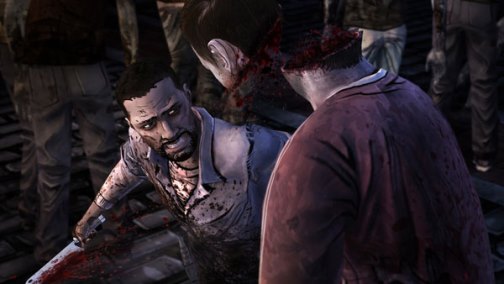All my life, I’ve been told that video games are incapable of having well written stories and characters. This isn’t just from literary critics; these types of arrogant comments have been made by fellow geeks at one time or another. It shows a deep divide that exists within geek culture. Many of these people have never played Mass Effect, Red Dead Redemption or The Last of Us. Many of them never will, to their own detriment. Still, it’s important to point out that video games have continued to grow and mature over the years. One such company that has emphasized the importance of story and characters is Telltale Games, a company that has earned its place as one of the best storytellers in the business.
Originally founded in 2004, Telltale Games is an American video game company known for its episodic gaming titles of licensed properties. Most of their games are released bi-monthly as episodes over the course of a year. Some of their most notable titles include Sam & Max, The Walking Dead and The Wolf Among Us.
Even after their initial success with their take on Sam & Max, a humorous game series that focused on an anthropomorphic dog and rabbit, the company struggled to maintain its relevance for a number of years. Episodic gaming was at an all-time low in the 2000s and their games based on Jurassic Park and Back to the Future were met with poor reviews. It wasn’t until 2012 that Telltale proved its capabilities as a developer with the release of The Walking Dead, a game based on the Robert Kirkman graphic novel series of the same name. With that title came a wave of success that not only brought the company back from obscurity, but reinvigorated interest in episodic gaming.
As noted by many critics, Telltale’s greatest achievement right now is its ability to avoid one of the biggest problems that plague multiple entertainment mediums by circumventing stereotypes and clichés when creating a character. Looking at their most recent games, you can tell that Telltale wants to offer gamers an experience through the eyes of a protagonist with a complicated personality. This is best observed when looking at the Lee Everett in The Walking Dead and Bigby Wolf in The Wolf Among Us.
While playing as Lee in The Walking Dead, I made choices that I thought matched the character’s personality. Yes, Lee starts the game as a convicted criminal, a murderer involved in a crime of passion. He’s not a heartless killer though. He carries a tremendous amount of guilt and goes through the game knowing that one’s actions can have irreversible consequences. In the end, Lee is a good man who might do horrible things to protect the people he cares about. This is repeatedly demonstrated when helping Clementine, the little girl who originally comes to his aid in the beginning of the first episode. The father-daughter relationship between these two is the centerpiece of Telltale’s zombie epic. Playing as Lee, you become invested in these two characters and you will do anything to protect that eight-year-old girl.
Bigby Wolf is another person haunted by his past actions. Based on Bill Willingham’s Fables, The Wolf Among Us takes place in 1980s New York City. In this game, fairytale creatures have abandoned their stories after an apocalyptic event destroyed their homes. In “Fabletown,” these fairytale characters are forced to live in rundown tenements, while struggling to provide for themselves and their families. Bigby, originally The Big Bad Wolf, now operates as the town’s sheriff.
Forced in a position he did not think he was qualified to have in the first place, Bigby struggles to help the people of Fabletown while trying to prove his past as a villain doesn’t represent who he is today. Bigby is probably an even more complicated protagonist than Lee. While gamers are told about Lee’s past in small doses, everyone is very much aware of The Big Bad Wolf’s history. That’s what makes Bigby and his interactions with other characters so interesting. Being a former bad guy allows players to play Bigby two different ways. Should Bigby try to show everyone that he genuinely cares for them, or should he prove that he hasn’t changed at all since his days of eating grandmas? Those decisions are up to the player.
Outside of Telltale’s work on The Walking Dead and Fables, the company is moving forward on two other projects based on popular properties. One such property is based on game developer Gearbox’s comedic/science-fiction shooter series, Borderlands. For those who are not aware, Borderlands focuses on Pandora, a dangerous alien world rich with resources and outlaws. Taking place after the events of Borderlands 2, Tales of the Borderlands features two lead protagonists who offer two contrasting sides of a story. Players will be introduced to con-artist Fiona and Hyperion worker Rhys. Throughout the game, it will be up to the player to decide which character is telling the truth and which one is lying. To match the original series’ writing style, Telltale’s Borderlands will harken back to the company’s comedic roots and place great emphasis on humor.
While no details have been revealed, it was also announced that Telltale will be developing a Game of Thrones game a few months ago. Thinking about making decisions that could spell the deaths of characters and their entire families could lead to some heart-wrenching choices in the world of Westeros.
Telltale is bringing about a renaissance in episodic gaming. Already deep into the second season of The Walking Dead and with only one episode left for The Wolf Among Us, the company is giving gamers an interactive experience like no other. This company has found a way to tell video game stories that aren’t focused on the next action set-piece, but the world and the characters that inhabit it.
What about you? Have you played any of Telltale’s past games? Are there other established properties that could benefit from the Telltale treatment? Let us know in the comments below!














